分词做状语 独立主格 悬垂分词
- 格式:pptx
- 大小:150.53 KB
- 文档页数:50
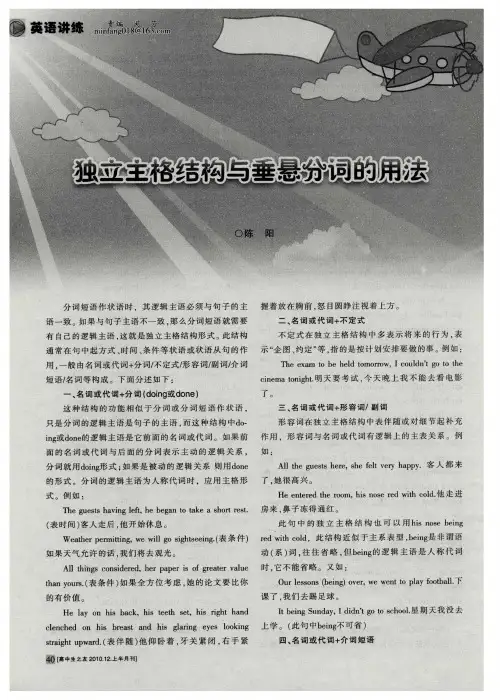

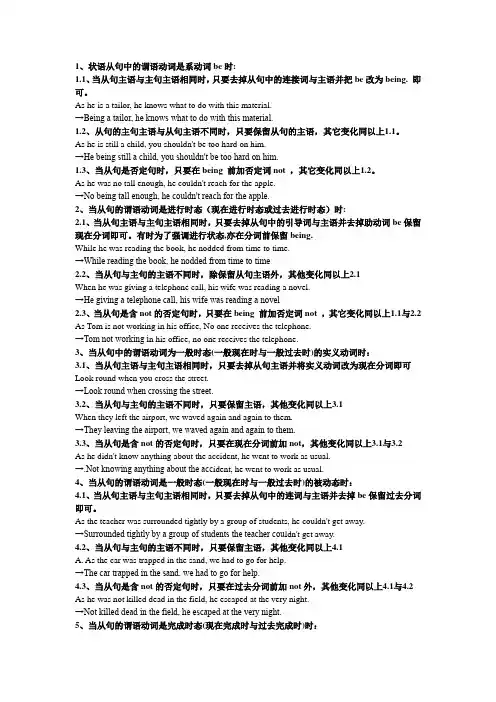
1、状语从句中的谓语动词是系动词be时:1.1、当从句主语与主句主语相同时,只要去掉从句中的连接词与主语并把be改为being. 即可。
As he is a tailor, he knows what to do with this material.→Being a tailor, he knows what to do with this material.1.2、从句的主句主语与从句主语不同时,只要保留从句的主语,其它变化同以上1.1。
As he is still a child, you shouldn't be too hard on him.→He being still a child, you shouldn't be too hard on him.1.3、当从句是否定句时,只要在being 前加否定词not ,其它变化同以上1.2。
As he was no tall enough, he couldn't reach for the apple.→No being tall enough, he couldn't reach for the apple.2、当从句的谓语动词是进行时态(现在进行时态或过去进行时态)时:2.1、当从句主语与主句主语相同时,只要去掉从句中的引导词与主语并去掉助动词be保留现在分词即可。
有时为了强调进行状态,亦在分词前保留being.While he was reading the book, he nodded from time to time.→While reading the book, he nodded from time to time2.2、当从句与主句的主语不同时,除保留从句主语外,其他变化同以上2.1When he was giving a telephone call, his wife was reading a novel.→He giving a telephone call, his wife was reading a novel2.3、当从句是含not的否定句时,只要在being 前加否定词not ,其它变化同以上1.1与2.2 As Tom is not working in his office, No one receives the telephone.→Tom not working i n his office, no one receives the telephone.3、当从句中的谓语动词为一般时态(一般现在时与一般过去时)的实义动词时:3.1、当从句主语与主句主语相同时,只要去掉从句主语并将实义动词改为现在分词即可Look round when you cross the street.→Look round when crossing the street.3.2、当从句与主句的主语不同时,只要保留主语,其他变化同以上3.1When they left the airport, we waved again and again to them.→They leaving the airport, we waved again and again to them.3.3、当从句是含not的否定句时,只要在现在分词前加not,其他变化同以上3.1与3.2As he didn't know anything about the accident, he went to work as usual.→.Not knowing anything about the acc ident, he went to work as usual.4、当从句的谓语动词是一般时态(一般现在时与一般过去时)的被动态时:4.1、当从句主语与主句主语相同时,只要去掉从句中的连词与主语并去掉be保留过去分词即可。
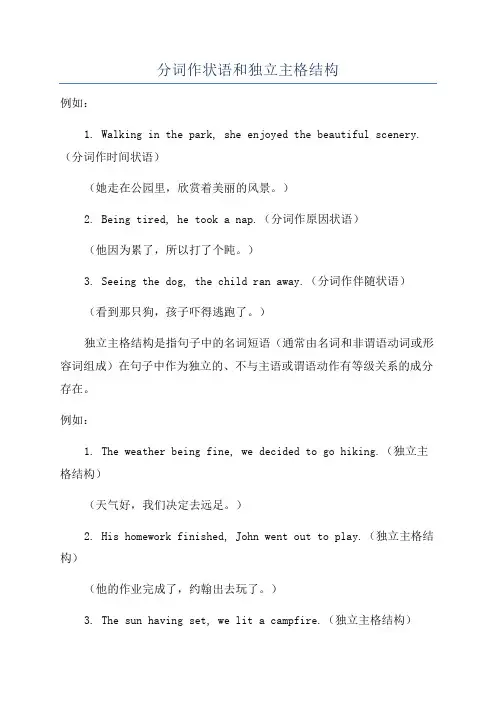
分词作状语和独立主格结构
例如:
1. Walking in the park, she enjoyed the beautiful scenery.(分词作时间状语)
(她走在公园里,欣赏着美丽的风景。
)
2. Being tired, he took a nap.(分词作原因状语)
(他因为累了,所以打了个盹。
)
3. Seeing the dog, the child ran away.(分词作伴随状语)
(看到那只狗,孩子吓得逃跑了。
)
独立主格结构是指句子中的名词短语(通常由名词和非谓语动词或形容词组成)在句子中作为独立的、不与主语或谓语动作有等级关系的成分存在。
例如:
1. The weather being fine, we decided to go hiking.(独立主格结构)
(天气好,我们决定去远足。
)
2. His homework finished, John went out to play.(独立主格结构)
(他的作业完成了,约翰出去玩了。
)
3. The sun having set, we lit a campfire.(独立主格结构)
(太阳已经落山,我们点燃了篝火。
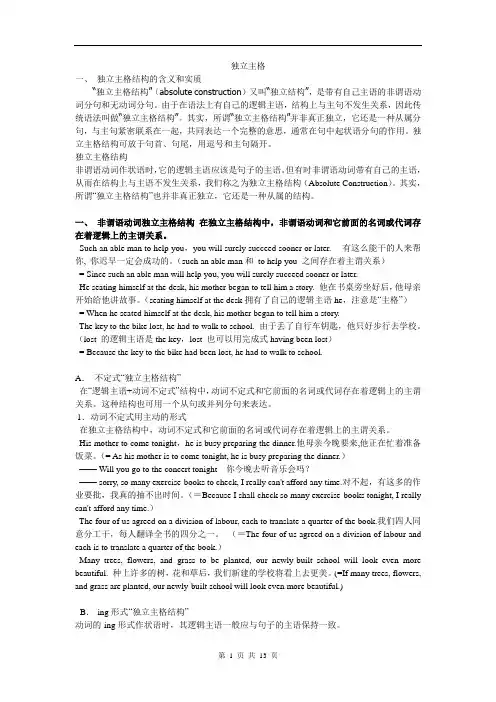
独立主格一、独立主格结构的含义和实质“独立主格结构”(absolute construction)又叫“独立结构”,是带有自己主语的非谓语动词分句和无动词分句。
由于在语法上有自己的逻辑主语,结构上与主句不发生关系,因此传统语法叫做“独立主格结构”。
其实,所谓“独立主格结构”并非真正独立,它还是一种从属分句,与主句紧密联系在一起,共同表达一个完整的意思,通常在句中起状语分句的作用。
独立主格结构可放于句首、句尾,用逗号和主句隔开。
独立主格结构非谓语动词作状语时,它的逻辑主语应该是句子的主语。
但有时非谓语动词带有自己的主语,从而在结构上与主语不发生关系,我们称之为独立主格结构(Absolute Construction)。
其实,所谓“独立主格结构”也并非真正独立,它还是一种从属的结构。
一、非谓语动词独立主格结构在独立主格结构中,非谓语动词和它前面的名词或代词存在着逻辑上的主谓关系。
Such an able man to help you,you will surely succeed sooner or later. 有这么能干的人来帮你, 你迟早一定会成功的。
(such an able man和to help you 之间存在着主谓关系)= Since such an able man will help you, you will surely succeed sooner or later.He seating himself at the desk, his mother began to tell him a story. 他在书桌旁坐好后,他母亲开始给他讲故事。
(seating himself at the desk拥有了自己的逻辑主语he,注意是“主格”)= When he seated himself at the desk, his mother began to tell him a story.The key to the bike lost, he had to walk to school. 由于丢了自行车钥匙,他只好步行去学校。

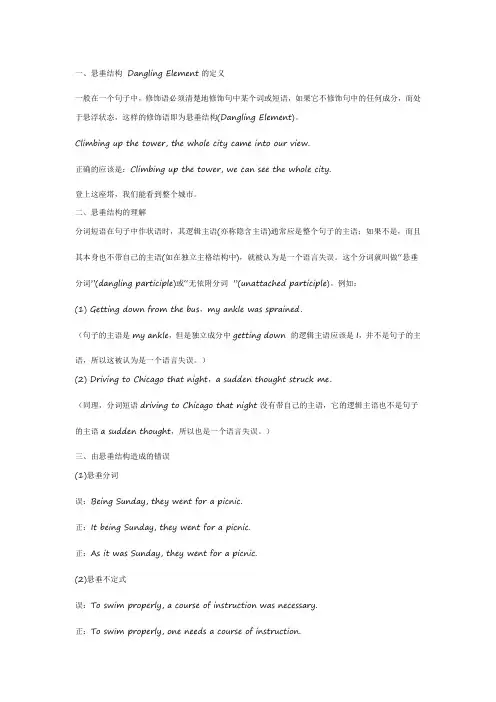
一、悬垂结构Dangling Element的定义一般在一个句子中,修饰语必须清楚地修饰句中某个词或短语,如果它不修饰句中的任何成分,而处于悬浮状态,这样的修饰语即为悬垂结构(Dangling Element)。
Climbing up the tower, the whole city came into our view.正确的应该是:Climbing up the tower, we can see the whole city.登上这座塔,我们能看到整个城市。
二、悬垂结构的理解分词短语在句子中作状语时,其逻辑主语(亦称隐含主语)通常应是整个句子的主语;如果不是,而且其本身也不带自己的主语(如在独立主格结构中),就被认为是一个语言失误。
这个分词就叫做“悬垂分词”(dangling participle)或“无依附分词”(unattached participle)。
例如:(1) Getting down from the bus,my ankle was sprained.(句子的主语是my ankle,但是独立成分中getting down 的逻辑主语应该是I,并不是句子的主语,所以这被认为是一个语言失误。
)(2) Driving to Chicago that night,a sudden thought struck me.(同理,分词短语driving to Chicago that night没有带自己的主语,它的逻辑主语也不是句子的主语a sudden thought,所以也是一个语言失误。
)三、由悬垂结构造成的错误(1)悬垂分词误:Being Sunday, they went for a picnic.正:It being Sunday, they went for a picnic.正:As it was Sunday, they went for a picnic.(2)悬垂不定式误:To swim properly, a course of instruction was necessary.正:To swim properly, one needs a course of instruction.(3)悬垂简式从句误:When a middle school student, his parents were very strict with him.正:When he was a middle school student, his parents were very strict with him.。
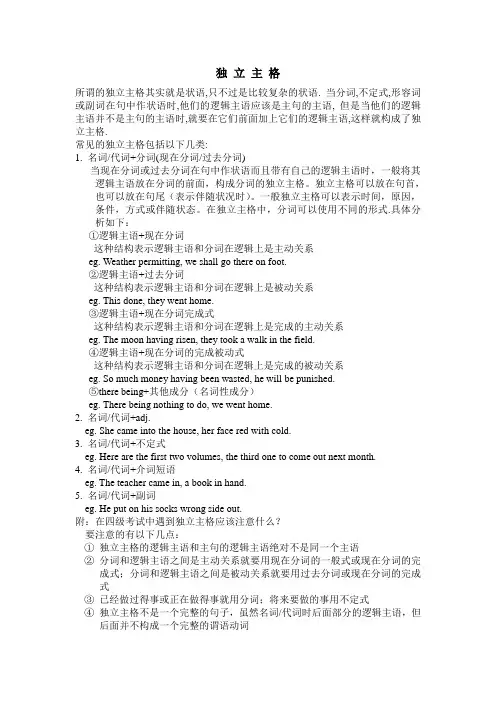
独立主格所谓的独立主格其实就是状语,只不过是比较复杂的状语. 当分词,不定式,形容词或副词在句中作状语时,他们的逻辑主语应该是主句的主语, 但是当他们的逻辑主语并不是主句的主语时,就要在它们前面加上它们的逻辑主语,这样就构成了独立主格.常见的独立主格包括以下几类:1. 名词/代词+分词(现在分词/过去分词)当现在分词或过去分词在句中作状语而且带有自己的逻辑主语时,一般将其逻辑主语放在分词的前面,构成分词的独立主格。
独立主格可以放在句首,也可以放在句尾(表示伴随状况时)。
一般独立主格可以表示时间,原因,条件,方式或伴随状态。
在独立主格中,分词可以使用不同的形式.具体分析如下:①逻辑主语+现在分词这种结构表示逻辑主语和分词在逻辑上是主动关系eg. Weather permitting, we shall go there on foot.②逻辑主语+过去分词这种结构表示逻辑主语和分词在逻辑上是被动关系eg. This done, they went home.③逻辑主语+现在分词完成式这种结构表示逻辑主语和分词在逻辑上是完成的主动关系eg. The moon having risen, they took a walk in the field.④逻辑主语+现在分词的完成被动式这种结构表示逻辑主语和分词在逻辑上是完成的被动关系eg. So much money having been wasted, he will be punished.⑤there being+其他成分(名词性成分)eg. There being nothing to do, we went home.2. 名词/代词+adj.eg. She came into the house, her face red with cold.3. 名词/代词+不定式eg. Here are the first two volumes, the third one to come out next month.4. 名词/代词+介词短语eg. The teacher came in, a book in hand.5. 名词/代词+副词eg. He put on his socks wrong side out.附:在四级考试中遇到独立主格应该注意什么?要注意的有以下几点:①独立主格的逻辑主语和主句的逻辑主语绝对不是同一个主语②分词和逻辑主语之间是主动关系就要用现在分词的一般式或现在分词的完成式;分词和逻辑主语之间是被动关系就要用过去分词或现在分词的完成式③已经做过得事或正在做得事就用分词;将来要做的事用不定式④独立主格不是一个完整的句子,虽然名词/代词时后面部分的逻辑主语,但后面并不构成一个完整的谓语动词悬垂分词正如在独立主格中所讲的, 分词作状语时,有两种情况: 1. 分词的逻辑主语是主句的主语; 2. 分词的逻辑主语如不是主句的主语,那么必须在分词前面加上它的逻辑主语, 否则就是错误的,如:eg. Looking up into the sky, she saw the moon shining bright and clear. (×)所以,一般情况下这种结构都是错误的,因为分词在句中没有自己的逻辑主语,也不和句子主语发生任何联系,所以称之为悬垂分词(致病的)。
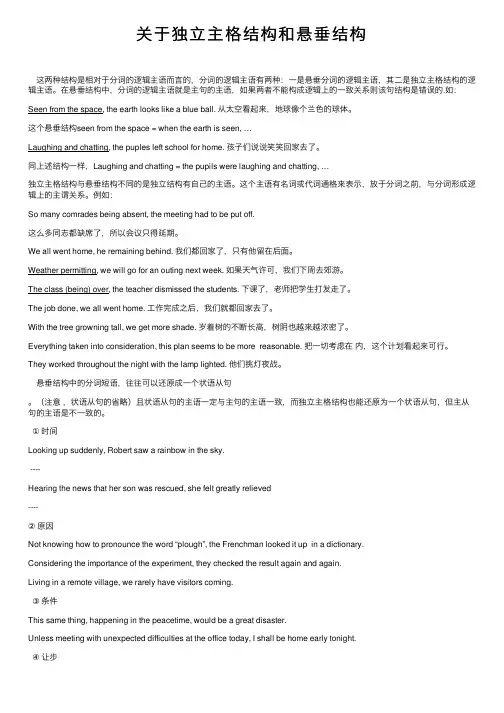
关于独⽴主格结构和悬垂结构这两种结构是相对于分词的逻辑主语⽽⾔的,分词的逻辑主语有两种:⼀是悬垂分词的逻辑主语,其⼆是独⽴主格结构的逻辑主语。
在悬垂结构中,分词的逻辑主语就是主句的主语,如果两者不能构成逻辑上的⼀致关系则该句结构是错误的.如:Seen from the space, the earth looks like a blue ball. 从太空看起来,地球像个兰⾊的球体。
这个悬垂结构seen from the space = when the earth is seen, …Laughing and chatting, the puples left school for home. 孩⼦们说说笑笑回家去了。
同上述结构⼀样,Laughing and chatting = the pupils were laughing and chatting, …独⽴主格结构与悬垂结构不同的是独⽴结构有⾃⼰的主语。
这个主语有名词或代词通格来表⽰,放于分词之前,与分词形成逻辑上的主谓关系。
例如:So many comrades being absent, the meeting had to be put off.这么多同志都缺席了,所以会议只得延期。
We all went home, he remaining behind. 我们都回家了,只有他留在后⾯。
Weather permitting, we will go for an outing next week. 如果天⽓许可,我们下周去郊游。
The class (being) over, the teacher dismissed the students. 下课了,⽼师把学⽣打发⾛了。
The job done, we all went home. ⼯作完成之后,我们就都回家去了。
With the tree growning tall, we get more shade. 岁着树的不断长⾼,树阴也越来越浓密了。
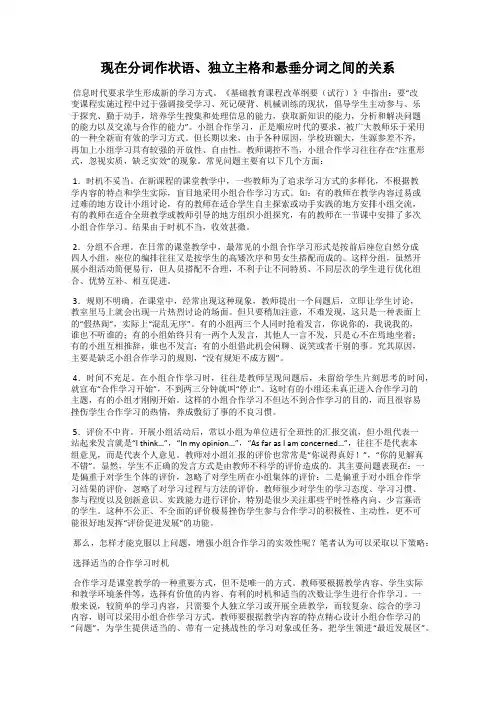
现在分词作状语、独立主格和悬垂分词之间的关系信息时代要求学生形成新的学习方式。
《基础教育课程改革纲要(试行)》中指出:要“改变课程实施过程中过于强调接受学习、死记硬背、机械训练的现状,倡导学生主动参与、乐于探究、勤于动手,培养学生搜集和处理信息的能力,获取新知识的能力,分析和解决问题的能力以及交流与合作的能力”。
小组合作学习,正是顺应时代的要求,被广大教师乐于采用的一种全新而有效的学习方式。
但长期以来,由于各种原因,学校班额大,生源参差不齐,再加上小组学习具有较强的开放性、自由性。
教师调控不当,小组合作学习往往存在“注重形式,忽视实质,缺乏实效”的现象。
常见问题主要有以下几个方面:1.时机不妥当。
在新课程的课堂教学中,一些教师为了追求学习方式的多样化,不根据教学内容的特点和学生实际,盲目地采用小组合作学习方式。
如:有的教师在教学内容过易或过难的地方设计小组讨论,有的教师在适合学生自主探索或动手实践的地方安排小组交流,有的教师在适合全班教学或教师引导的地方组织小组探究,有的教师在一节课中安排了多次小组合作学习。
结果由于时机不当,收效甚微。
2.分组不合理。
在日常的课堂教学中,最常见的小组合作学习形式是按前后座位自然分成四人小组,座位的编排往往又是按学生的高矮次序和男女生搭配而成的。
这样分组,虽然开展小组活动简便易行,但人员搭配不合理,不利于让不同特质、不同层次的学生进行优化组合、优势互补、相互促进。
3.规则不明确。
在课堂中,经常出现这种现象,教师提出一个问题后,立即让学生讨论,教室里马上就会出现一片热烈讨论的场面。
但只要稍加注意,不难发现,这只是一种表面上的“假热闹”,实际上“混乱无序”。
有的小组两三个人同时抢着发言,你说你的,我说我的,谁也不听谁的;有的小组始终只有一两个人发言,其他人一言不发,只是心不在焉地坐着;有的小组互相推辞,谁也不发言;有的小组借此机会闲聊、说笑或者干别的事。
究其原因,主要是缺乏小组合作学习的规则,“没有规矩不成方圆”。
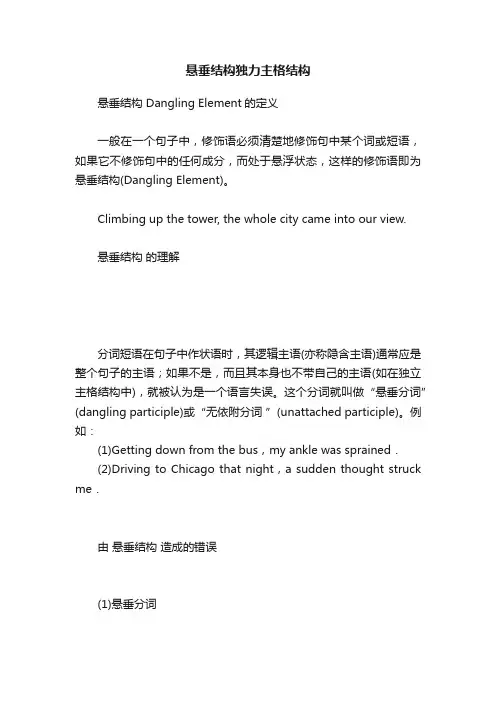
悬垂结构独力主格结构悬垂结构 Dangling Element的定义一般在一个句子中,修饰语必须清楚地修饰句中某个词或短语,如果它不修饰句中的任何成分,而处于悬浮状态,这样的修饰语即为悬垂结构(Dangling Element)。
Climbing up the tower, the whole city came into our view.悬垂结构的理解分词短语在句子中作状语时,其逻辑主语(亦称隐含主语)通常应是整个句子的主语;如果不是,而且其本身也不带自己的主语(如在独立主格结构中),就被认为是一个语言失误。
这个分词就叫做“悬垂分词”(dangling participle)或“无依附分词”(unattached participle)。
例如:(1)Getting down from the bus,my ankle was sprained.(2)Driving to Chicago that night,a sudden thought struck me.由悬垂结构造成的错误(1)悬垂分词误: Being Sunday, they went for a picnic.正: It being Sunday, they went for a picnic.正: As it was Sunday, they went for a picnic.(2)悬垂不定式误:To swim properly, a course of instruction was necessary.正:To swim properly, one needs a course of instruction.(3)悬垂简式从句误:When a middle school student, his parents were very strict with him.正:When he was a middle school student, his parents were very strict with him.在学习语法过程中,请掌握技巧,然后理解消化.独力主格结构(the absolute structure)的定义由名词或代词加上分词或分词短语构成的一种独立结构,用于修饰整个句子,而不是一个词或词组。
分词做状语和独立主格结构分词做状语:分词可以作为状语来修饰动词、形容词、副词等,来表示时间、原因、方式、条件、让步等等。
1.时间:- Having finished his homework, he went to bed.- After eating dinner, they went for a walk.- While studying for the exam, she listened to music.2.原因:- Being tired, she decided to take a break.- Seeing the dark clouds, we decided to stay indoors.- Not knowing the answer, he asked for help.3.方式:- The teacher explained the concept clearly, making it easy for everyone to understand.- He won the race by running faster than the others.4.条件:- If invited, I will attend the party.- Unless you apologize, I won't forgive you.5.让步:- Despite being tired, he continued working.- Although feeling sick, she still came to the meeting.- In spite of the rain, they went hiking.分词做独立主格结构:在句子中,独立主格结构是由名词、代词或分词构成的结构,它通常用逗号与主句分开。
独立主格结构对主句作补充说明和解释。
1.用名词构成的独立主格结构:- The sun shining brightly, we decided to go for a picnic.- The concert being cancelled, we had to make alternative plans.- Her parents out of town, she had to take care of her younger siblings.2.用代词构成的独立主格结构:- He leading the team, they were sure to win the game.- You working hard, success is within reach.- She being the oldest, she was always responsible for her younger siblings.3.用分词构成的独立主格结构:- Seeing the opportunity, she decided to seize it.- Knowing the answer, he confidently raised his hand.。
语法2分词独立结构分词(V-ing形式和V-ed形式)可以做分词的状语成分。
分词在做状语时,若分词与主语是主动的逻辑关系,则用现在分词;若是被动逻辑关系,则用过去分词。
若它的逻辑主语不是句子的主语,则可带上句子的逻辑主语。
分词的逻辑主语可以是句子的主语,也可能是句子的其他成分;若分词的逻辑主语在句子中找不到对应的成分时,则分词可称为“悬垂分词”这种情况本身存在一种“可接受性”问题,因此,在没有上下文的情况下,一般应避免使用“悬垂分词”。
若分词有自己的独立的主语,则可带上这个独立意义的逻辑主语,但状语仍然是分词状语。
分词独立结构可以由with(或没有with)引起,此外,there be结构也可引起分词独立结构。
练习:1. After the Arab states won independence, great emphasis was laid on expending education, with girls as well as boys__ to go to school. (1997.1.26)A. to be encouraged C. being encouragedB. been encouraged D. be encouraged2. __, a man who expresses himself effectively is sure to succeed more rapidly than a man whose commend of language is poor. (1997.6.56)3. All things__, the planned trip will have to be called off.(1998.6.49)4. All flights__ because of the snowstorm, many passengers could do nothing but take the train.(1999.1.51)5. The house was very quiet, __ as it was on the side of a mountain. (1999.6.48)A. Other things being equal C. To be equal to other thingsB. Were other things equal D. Other things to be equal6. I hope all the precautions against pollution, __ suggested by the local government, will be seriously considered here. (1999.6.53)7. __ in this way, the situation doesn’t seem so disappointed. (2000.1.68)8. __ in a recent science competition, the three students were rewarded scholarship totaling $21,000. (2001.1.46)9. So many directors __, the board meeting had to be put off. (2001.1.58)10. All the tasks__ ahead of time, they decided to go onholiday for a week. (2001.6.56)11. We left the meeting, there obviously __no point in staying. (2002.6.58)12. Professor Wang, __for his informative lectures, was warmly received by his students. (2003.1.53)。